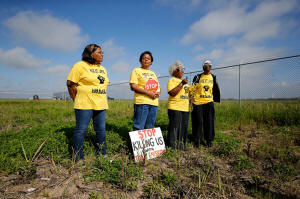Lawsuit alleging environmental racism in Louisiana parish allowed to
proceed, federal court says
[April 10, 2025]
By JACK BROOK
NEW ORLEANS (AP) — A civil rights lawsuit alleging a south Louisiana
parish engaged in racist land-use policies by placing polluting
industries in majority-Black communities can move forward, a federal
appellate court says.
On Thursday, the 5th U.S. Circuit Court of Appeals in New Orleans ruled
that a trio of faith-based community groups could proceed with a lawsuit
alleging racial discrimination in the petrochemical buildout in St.
James Parish, a region in the heart of Louisiana's heavily
industrialized Chemical Corridor. It is often referred to by
environmental groups as “Cancer Alley” for its high levels of pollution.
The lawsuit calls for a moratorium on the construction and expansion of
petrochemical plants in St. James Parish. When the lawsuit was filed in
March 2023, 20 of the 24 industrial facilities were in two sections of
the parish with majority-Black populations.
The U.S. Environmental Protection Agency found in a 2003 report that St.
James Parish ranked higher than the national average for certain cancer
deaths. Both majority-Black sections of the parish are ranked as having
a high risk of cancer from toxic pollutants according to an EPA
screening tool based on emissions reported by nearby facilities, the
lawsuit notes.
"We have been sounding the alarm for far too long that a moratorium is
needed to halt the expansion of any more polluting industries in our
neighborhoods, and too many lives have been lost to cancer,” said Gail
LeBoeuf, a lifelong parish resident and co-founder of Inclusive
Louisiana. She is a plaintiff in the case.

[to top of second column]
|

Myrtle Felton, from left, Sharon Lavigne, Gail LeBoeuf and Rita
Cooper, members of RISE St. James, conduct a live stream video on
property owned by Formosa on March 11, 2020, in St. James Parish,
La. (AP Photo/Gerald Herbert, File)

The case will now go back to the U.S. District Court in the Eastern
District of Louisiana, which had previously ruled the lawsuit was
filed too late by Inclusive Louisiana and other community groups
because the allegations centered on a 2014 parish land-use plan.
But the federal court said the complaint was filed on time and noted
that the lawsuit was “replete with allegations of discriminatory
land use decisions” in the parish, of which the 2014 plan was just
one example.
The court also recognized that the groups had a right to sue the
parish for authorizing industrial development which “desecrates,
destroys, and restricts access” to the cemeteries of their enslaved
ancestors in the parish. Many of the petrochemical facilities in
Louisiana are built on former plantations, and few of the burial
sites of the enslaved have been preserved.
“I think it’s a real vindication of their struggle," said Pamela
Spees, a lawyer with the Center of Constitutional Rights
representing the plaintiffs. “This is a case about long-running
ongoing discrimination and now we get to deal with the claims on
their merits.”
St. James Parish did not immediately respond to a request for
comment.
All contents © copyright 2025 Associated Press. All rights reserved |